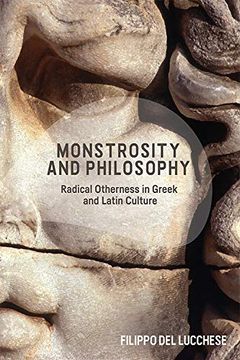Compartir
Monstrosity and Philosophy: Radical Otherness in Greek and Latin Culture (en Inglés)
Filippo Del Lucchese (Autor)
·
Edinburgh Univ Pr
· Tapa Dura
Monstrosity and Philosophy: Radical Otherness in Greek and Latin Culture (en Inglés) - Filippo Del Lucchese
$ 394.645
$ 789.015
Ahorras: $ 394.371
Elige la lista en la que quieres agregar tu producto o crea una nueva lista
✓ Producto agregado correctamente a la lista de deseos.
Ir a Mis Listas
Origen: Reino Unido
(Costos de importación incluídos en el precio)
Se enviará desde nuestra bodega entre el
Martes 18 de Junio y el
Martes 25 de Junio.
Lo recibirás en cualquier lugar de Colombia entre 1 y 5 días hábiles luego del envío.
Reseña del libro "Monstrosity and Philosophy: Radical Otherness in Greek and Latin Culture (en Inglés)"
Reveals monstrosity to be a central conceptual challenge in every ancient Greek and Roman philosophical system Amazons and giants, snakes and gorgons, centaurs and gryphons: monsters abounded in ancient culture. They raise enduring philosophical questions: about chaos and order; about divinity and perversion; about meaning and purpose; about the hierarchy of nature or its absence. Del Lucchese grapples with the concept of monstrosity, showing how ancient philosophers explored metaphysics, ontology, theology and politics to respond to the challenge of radical otherness in nature and in thought. Each chapter explores the emergence of monstrosity in a set of authors and theories. In chapter 1, monsters rise as the challenging adversaries of the new gods of the early cosmogonies. But they can also be powerful productive forces that support building the new order or ambiguous characters that catalyse the unfolding of the tragic universe. In chapter 2, the Pre-Platonic systems of Anaxagoras, Empedocle and Democritus pave the way for the recognition of the philosophical status of monstrosity. This status becomes central in Attic philosophy, first with Plato's mythological monstrosities and then with the construction of a hierarchical structure of the universe: taken up in chapter 3. Chapter 4 focuses on Aristotle's study of physical monstrosity and its role within his metaphysical and aetiological framework. Chapters 5 to 7 deal with the extraordinarily elaborate responses to Attic philosophy by the major Hellenistic systems: Epicureanism, Stoicism and Scepticism. The final chapter looks at the Middle and Neoplatonist response to Hellenism and explores the richness of late-antiquity's reflection on monstrosity up to its absorption and reworking by early Christian thought.
- 0% (0)
- 0% (0)
- 0% (0)
- 0% (0)
- 0% (0)
Todos los libros de nuestro catálogo son Originales.
El libro está escrito en Inglés.
La encuadernación de esta edición es Tapa Dura.
✓ Producto agregado correctamente al carro, Ir a Pagar.

